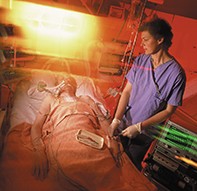Is a patient’s consent needed to test for an infectious disease?
Consider the following situation that arises not infrequently in hospitals. A patient is unconscious, or unable to give consent for another reason, such as being anaesthetised. A member of the theatre staff sustains a needlestick injury and the hospital wants to test the patient’s blood for HIV and hepatitis B and C viruses so that prophylaxis can be undertaken if the test is positive. The patient’s condition means that permission cannot be obtained from him or her to take blood for testing for several hours. HIV prophylaxis could be started within 24 to 72 hours and stopped if the patient is eventually found to be HIV-negative. However, there is a large amount of anxiety in these situations and it would certainly help the staff member if he or she knew within a few hours whether the patient is infected. Also, there are risks associated with the prophylaxis itself. If prophylaxis is not necessary because the patient is not infected, then it would obviously be preferable not to expose health professionals to those risks.

